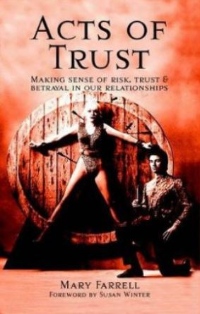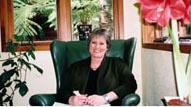Psychotherapist MARY FARRELL has written a book about trust – trust in yourself and trust in others. She told ROSAMUND BURTON about the motivation behind the book, the stories, the stories it tells and its message.
 Mary Farrell was inspired to write Acts of Trust: Making Sense of Risk, Trust and Betrayal in Our Relationships after hearing a story on the radio about a circus couple who did a William Tell act. The man fired the arrow and it hit his wife above the eye. The woman did not die, but Farrell was unable to get the incident out of her mind. She kept thinking what if he had intended to hurt her, was a drunk, or was having an affair with somebody else?
Mary Farrell was inspired to write Acts of Trust: Making Sense of Risk, Trust and Betrayal in Our Relationships after hearing a story on the radio about a circus couple who did a William Tell act. The man fired the arrow and it hit his wife above the eye. The woman did not die, but Farrell was unable to get the incident out of her mind. She kept thinking what if he had intended to hurt her, was a drunk, or was having an affair with somebody else?
She researched William Tell acts on the internet and discovered a couple called Ross and Eliza Hartzell. They have known each other since they were four years old. He is responsible for the safety of her rigging when she worked as a trapeze artist without a net, and they have a huge level of trust in each other. This led Farrell to look at trust and what it means to different people.

Mary Farrell author of of Acts of Trust
Mary Farrell is a psychotherapist. Aged 57, originally from northern England, she now lives with her husband and 17-year-old son in the Waitakere Ranges west of Auckland. She believes that early childhood experiences have a strong impact on the levels of trust people have as adults, and that children need to be given positive mirroring so they develop a sense of self-belief.
Mary had an unusual childhood herself. Her mother was an Irish Catholic and her father a Russian Jew. As her mother was not Jewish her father’s family said “kaddish”, the Jewish prayer for the dead, when he married. ‘He was dead as far as they were concerned.’ Because her father was a forensic scientist, his work involved him in murders and there was a lot of talk about murders at home. ‘There were always photographs of bodies spread out on out dining room table,’ says Farrell, ‘so it was a bit macabre.’ She adored her father, but had a very difficult relationship with her mother. ‘I have a vivid memory of my mother coming home from the Moors murders trial that my father was the pathologist on, and making some horrible remarks about my looking like Myra Hindley [the mass murderer in the case]. I was fifteen at the time.’
The upside of Mary’s childhood was that her parents both loved the theatre, and their idea of a holiday was to go to Stratford-upon-Avon and watch three weeks of Shakespeare. Farrell was five years old when she was taken to see A Midsummer Night’s Dream, which sparked her passion for the Elizabethan bard. She admits she has seen twenty different productions of Hamlet. She joined the drama society when she was at Leeds University, and with a degree in English literature and art history under her belt went into the theatre. She has worked as a psychotherapist since 1988 but continued her acting and directing work until she moved to New Zealand twelve years ago.
‘He’s mad that trusts in the tameness of a wolf, a horse’s health, a boy’s love or a whore’s oath,’ says the Fool in King Lear. Mary Farrell uses that quote as a hanger for the stories in Acts of Trust.
One story is about Rae Evening Earth Ott, who runs a wolf reservation near Houston, Texas. She was physically and verbally abused by her father, and for many years believed that she was defective and unloveable. However, from an early age she also realized she had a special connection with wolves. During her first encounter with a wolf her fingers were licked by a creature which was reportedly very fierce and prone to biting. A few years later Rae was adopted by a Lakota holy man who taught her that she was worthy of love and respect, and helped her follow her dream to devote her life to wolves.
The book’s main message is that a traumatic childhood does not have to blight a person’s entire life.
Franklin Levinson, the horse whisperer described in the book, also found a role model on whom he could rely and who loved him, which Farrell believes was vital to his success in life. ‘Children are so little and so powerless, they can’t do it by themselves,’ she explains.
Farrell looks at older women and gay men going out with younger men and the trust issues surrounding that; a prostitute who describes never being able to trust her clients; and New Zealand actor Michael Hurst, who had a nightmarish childhood yet, due to his schoolteachers’ belief in his acting talent, developed an enormous amount of self-belief.
Writing the book, Farrell says, has helped her to understand the huge importance of trusting yourself.
‘If we trust ourselves then we can trust our own instincts and intuition, and we are less likely to be shafted by other people.’
Acts of Trust shows the links that make up people’s lives, she concludes, and it’s main message is that a traumatic childhood does not have to blight a person’s entire life.
Article posted 9 May 2010
Acts of Trust: Making Sense of Risk, Trust and Betrayal in Our Relationships by Mary Farrell is published by Exisle Publishing.
This interview was originally published in Goodreading Magazine September 2007, and is posted here with kind permission of Mary Farrell

